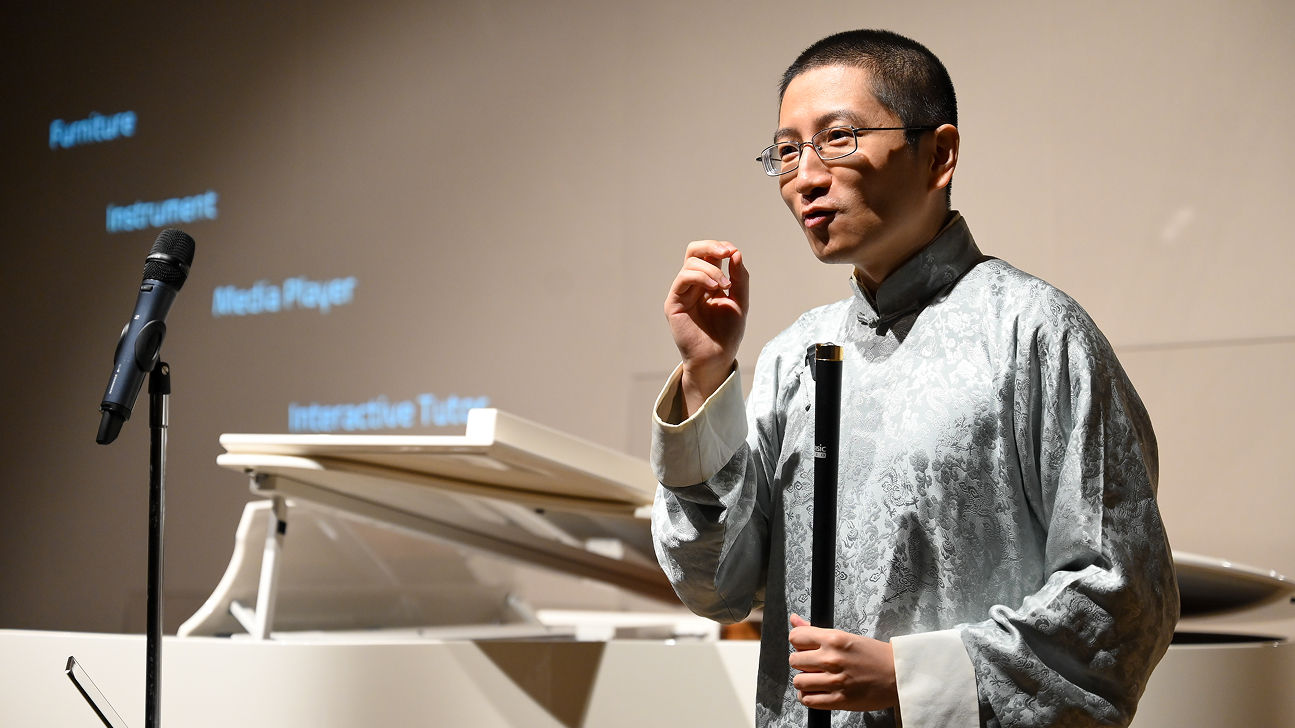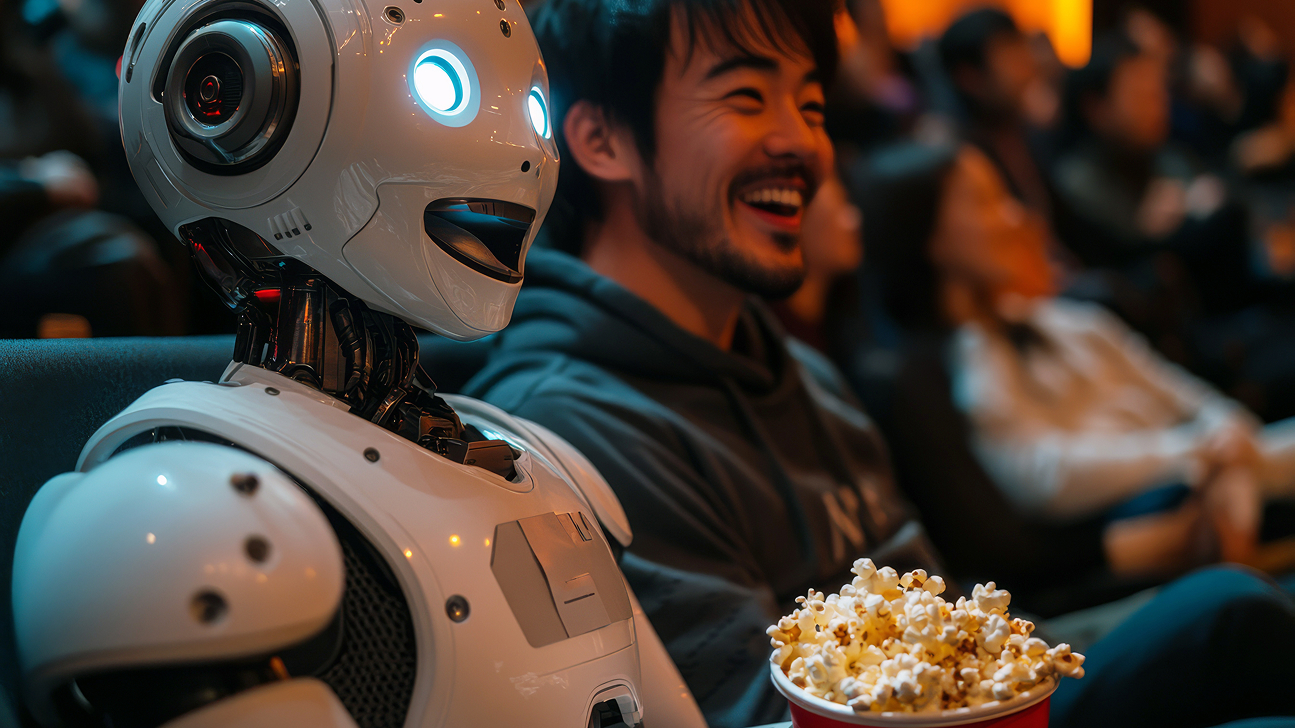Composition and code: how Gus Xia is using music and metaphysics to advance AI
Friday, July 25, 2025

From professional musician to AI scientist; from slime mold to music-education robotics; from computational creativity to the metaphysics of emergent language, Gus Xia’s academic journey has been far from typical.
Trained as a computer scientist, classical musician, and interdisciplinary thinker, his breadth of talent and depth of curiosity has seen him invent haptic instruments to teach music to beginners, guide students into AI-powered entrepreneurship, and even treat living organisms as collaborators in digital creativity.
Now, the Associate Professor of Machine Learning at MBZUAI aims to instil a similar sense of curiosity and excitement in the next generation of AI talent, serving as one of the University’s faculty for the debut batch of undergraduate students, arriving this Fall.
“A small group of faculty designed the skeleton of a curriculum that we’re very excited about,” he says. “I will be co-teaching a session of the introduction to AI with Monojit Choudhury, Professor of Natural Language Processing, and I think it will be a totally new experience for the students.
“What we want to teach is not just the knowledge, but to go beyond knowledge into something profound, fundamental, and experiential. We want to show the students the essence of intelligence and inspire them to build AI technologies from the first principle.
“Most of all, we want them to just enjoy the class. I hope we can plant a seed deeply within them so that years later it may flourish and grow into something big. I think we’ll have a lot of fun doing that.”
Xia will certainly provide enthusiasm and passion to the new starters, who are helping the University evolve from its founding status as a graduate-level research institution into a multi-faceted centre of learning – one that caters to undergraduates, master’s and Ph.D. students, post-doc, researchers, and public and private sector leaders through its executive programs.
More than 100 students from the UAE and around the world will join the Bachelor of Science in Artificial Intelligence program – a first-of-its kind AI degree designed for those who want to lead, innovate, and push boundaries.
Xia’s own undergraduate studies took place at Peking University, where he graduated in information science, with a minor in psychology. At the same time, he was running the university’s Chinese Music Institute as president, having studied performance of the di – the Chinese flute – with Master Weiliang Zhang at the China Conservatory of Music.
To combine his passion in music with his areas of research interest, he opted to study computer music at Carnegie Mellon University (CMU) in the U.S. Later transferring to machine learning, Xia spent six years at CMU, completing his Ph.D. with a thesis on learning-based automatic accompaniment and improvisation systems.
Interesting directions
It was at CMU that Xia demonstrated the kind of exploration and discovery that he hopes to see among his upcoming undergrad students. His research at the intersection of music and AI led him to Dartmouth College, also in the U.S., where he embarked on two projects that would shape his future career.
“Dartmouth has one of the oldest digital music centers, and is very interdisciplinary. So, when I did my post-doc there, I was able to go in some very interesting directions,” he says.
“First was haptic guidance for human music learning. That came from a question my friend asked me. He said, ‘I know nothing about music – could you invent something that enables me to play something simple?’ I took on that challenge and learned how to combine hardware and software such as music robots, haptic devices and 3D printing.
“We eventually designed a haptic flute – a flute with finger rings that guide your finger to help you build muscle memory. That was my first AI for human-music education.”
The second project, he adds, was “even more mind-blowing”: using slime mold to create music.
“Slime mold is a single cell multi-nuclei creature, and it has some amazing intelligence,” he explains. “It can solve maze problems, and has some simple memory. We wondered whether we could regard slime molds as live computational models to generate music and understand the underlying mechanisms of it. This has given me a unified view about intelligence from both AI and biological systems.”
At MBZUAI, Xia is currently working on areas called functional alignment and emergent language – researching how machines might listen to music with no human supervision and derive symbolic notation and music theory.
“Machines can now learn the concept of numbers, natural numbers, and addition. This is called emergent ability in AI. We are working on symbolic language emergence. Solely based on sensory input and experience, how might machines give rise to symbolic language and structure? This is the most philosophical and metaphysical thing that my group at MBZUAI has been working on.”
Modelling creativity
It’s this kind of innovative thinking and boundary-crossing experimentation that has defined Xia’s outlook on AI: one that sees art and creativity as critical to its development.
“If we truly want to build artificial intelligence, we have to understand how intelligence works,” he says. “One way we can figure this out, I believe, is to get hints from different fields.
“Art and creativity are important parts of intelligence. Humans are not just optimising utility in daily life – we have some inner perception of beauty and aesthetics. So, let us model it.”
Xia himself put this into practice as soon as he arrived in the UAE: organising an AI music concert at the Steinway Centre in Dubai – the first concert of its kind.
His approach is also influencing student research at MBZUAI, including projects that are being turned into start-up business, such as Audiomatic – a platform that creates AI-driven audio production.
“The two students who founded it, Taimoor and Ahmad, are great students – they founded the company and incubated it at MBZUAI’s Incubation and Entrepreneurship Center.
“Audiomatic solves daily music needs. Say you have a video, but there’s no music behind it – this platform generates the music for you. So, they are serving society, which I really like. And what they are doing now is copyright detection, which will help AI creators and musicians get paid fairly, which I really, really like.”
Xia is also contributing to a critical global conversation about fairness and representation in AI. In a recent study, he and his colleagues investigated bias in AI music systems, finding that many popular datasets skew towards Western classical and pop traditions — potentially reinforcing cultural homogeneity in machine-generated art.
The study, which proposes a framework for more inclusive and representative datasets, highlights how Xia’s research consistently straddles the cutting edge and the ethical. His CV is extensive – more than 60 peer-reviewed papers, over 2,000 citations, and keynote slots at global conferences.
But what defines his work is not scale, but spirit: an insistence that AI, for all its power, must remain human-aligned – expressive, equitable, and expansive. A lesson that MBZUAI’s first cohort of undergraduate students will do well to learn.
- machine learning ,
- robotics ,
- faculty ,
- undergraduates ,
- intelligence ,
- music ,
- creativity ,
Related
From Silicon Valley to social impact through science and education
Eduardo Beltrame reflects on his journey from Brazilian public education to Silicon Valley and MBZUAI, and why.....
- computational biology ,
- entrepreneurship ,
- faculty ,
- biology ,
- Undergraduate ,
- digital public health ,
- social impact ,
AI and the silver screen: how cinema has imagined intelligent machines
Movies have given audiences countless visions of how artificial intelligence might affect our lives. Here are some.....
- fiction ,
- science fiction ,
- art ,
- cinema ,
- artificial intelligence ,
- AI ,
Mind meld: agentic communication through thoughts instead of words
A NeurIPS 2025 study by MBZUAI shows that tapping into agents’ internal structures dramatically improves multi-agent decision-making.
- agents ,
- neurips ,
- machine learning ,


